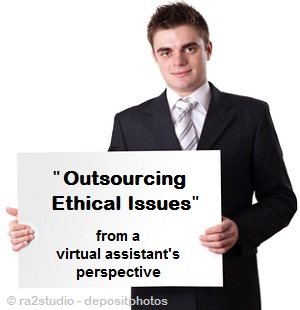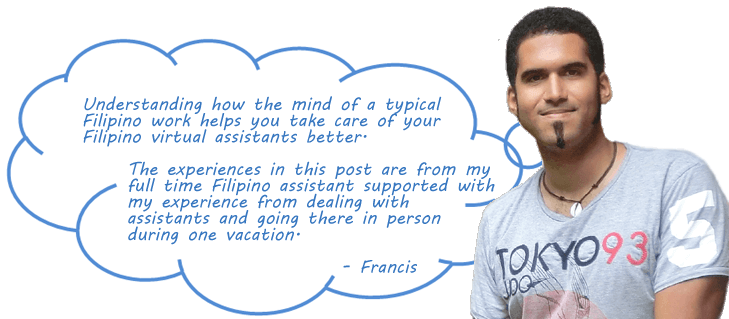Learn how to outsource morally. When you choose to cheaply hire someone to work for you as a virtual assistant, you have a responsibility towards him and should know about ethics in business.
Business Ethics
Reader Interactions
Outsourcing From The Point Of View Of German Business Ethics
 I have outsourced numerous jobs to Asian, African and American countries, but as an employer I am based in Germany. So, I am pretty well positioned to illustrate how outsourcing is viewed from the point of view of German business ethics.
I have outsourced numerous jobs to Asian, African and American countries, but as an employer I am based in Germany. So, I am pretty well positioned to illustrate how outsourcing is viewed from the point of view of German business ethics.
Here are the most important positive aspects of German business mindsets that you will have to know about.
Click here to read about the negative aspects of German work ethics.
Integrity and loyalty
One of the highest praised traits in German business ethics is the ability to have personal integrity and to be loyal to your associates. Backstabbing someone, lying or corruption are not well received from the average German.
That is not to say that corruption doesn’t exist.
It does.
But compared to levels of some South American countries, it is probably much lower.
In order to impress a German employer as an outsourcing freelancer, it is of central importance that you show him:
- he can trust you
- you have his back
- and you would never lie to him
A lack of integrity will be a certain reason for him to fire you.
Work loving ethics
The cliché is true that Germans love their work and that being employed and working hard are core principles in the self-confidence of a German person.
The importance of seniority
It is common in German businesses to be promoted after a certain amount of years to a certain position. If you are not advancing at a certain rate per year, people will ask starting questions.
What does it mean for an outsourcing provider?
Even if you perform great, it is not intuitive from the point of view of German business ethics to be promoted within a short amount of time. This is where patience is needed in the short-timed world of internet businesses.
It is best to stick with one German employer for a longer amount of time than trying to run up the ladder to a higher position in the shortest amount of time possible.
Try showing your employer your skills and loyalty, integrity and hard work on a long term basis. He will be impressed.
Specialization over generalization
By specializing in certain tasks, it is more likely that the worker keeps his job because he knows it better than anyone. This is a consequence of the German business ethics principle of “safety comes first”.
As a freelancer, try to get hired as a specialist for a specific position. If you have shown that you can do this, step-by-step carve out your responsibility zone.
Don’t try to do everything at once from the start.
The importance of time

Germans love to be punctual. I am not an exception.
They expect punctuality from other people, even if they come from other countries. This can result in some pretty comical scenes if you experience e.g. waiting for hours to days in an African country for a bus where in Germany you would get inpatient if it has five minutes delay.
To adapt to German business ethics as a freelancer, it is best to take time requirements very literally. If a German outsourcing employer says “Three days” then he will mean “three times twenty-four hours.”
The best course of action as a freelancer is to be
- extremely organized,
- highly punctual
- and to the highest degree reliable.
You cannot overdo it in this domain.
High prosperity
Germany is a pretty rich country compared to most Asian countries, where freelancing is popular.
You are extremely unlikely to die of hunger or thirst anywhere in Germany, even without having a job.
There are high social security laws; therefore most Germans are not “aware” of the seriousness of the poverty for example in some Asian or African countries. They intellectually know about it, but it is not very plastic before their eyes.
It won’t be very easy to convince a German employer that someone can actually live from an hourly rate of $1 to $2 per hour. If more Germans would know about that fact, then I believe many more people would turn to outsourcing.
On the other hand, a core German business ethics principle is to be economical at all time. Some would go as far as to say that many Germans are stingy.
Although you could be doing pretty well as a freelancer, doing outsourced work for a German employer, it will take some negotiation skills to get a share of the wealth of your German employer.
That in a sense is summing up all the core principles of German business ethics.
A final note
Everything in this article is my personal opinion.
I cannot talk about all the people from my country. I can only share what my personal opinion and observations are.
If you live in this country, you will need to admit that many of my points are true. Some of them might be slightly exaggerated, but not all of them.
And of course there are people and individuals everywhere who are very well-balanced, highly international and not stereotypical at all.
Still, stereotypes exist for a reason.
Bad Sides Of German Business Ethics
 Working with Germans is not always easy. To be fair to everyone, I have separated my discussion about the good and the bad aspects of German business ethics. This article talks about what are not-so-ideal typical-German ideas.
Working with Germans is not always easy. To be fair to everyone, I have separated my discussion about the good and the bad aspects of German business ethics. This article talks about what are not-so-ideal typical-German ideas.
Click here to read about the good side of German working ethics.
Fear of the unknown
There is a Bavarian saying:
“What we don’t know, we won’t eat”
(Original: “Wos mia ned kenna, des iss’ ma ned”)
This saying is a good metaphor for a core principle of German business ethics. Most people from Germany like to do business and interact with people that know the German culture.
There are of course many exceptions. But if we talk about the vast majority, elderly people or people with lower education levels, this statement pretty much covers it.
Male Money Makers
Although what I am about to say is highly politically incorrect and many people are going to bash my skull in, it is a fact that many male workers are making more money than female workers.
There are actually laws trying to convince corporations to hire a specific percentile of women into the work place and into leading positions. Statistics still show that traditionally, it is the man who is making more money than the female workers.
Nevertheless, it is accepted German business ethics that working women are not looked down upon. Many Germans naturally project this point of view on foreign countries and cannot understand how, in poor countries, women might have lower education levels or work opportunities.
In general, a German outsourcing employer treats female freelancers the same way that he would interact with male freelancers.
Low sense of entrepreneurship
In Germany, traditionally, the sense of entrepreneurship and risk taking is much lower than in the US. There are also much higher barriers to launching an enterprise.
Risk taking is not one of the strengths of the traditional person following German business ethics.
Obeying your boss
Without getting into risky territory here, it is a generally accepted fact that most workers do like to follow clear instructions from their superiors. The thought-structure of the average German worker and employer is very hierarchical and organized.
Transferred to outsourcing, Germans will assume the same from strangers.
Love of Safety

Personal safety and job safety are some of the most important pillars in German business ethics and general ethics.
The German city Munich is extremely safe. A girl could go out partying and return home alone through the dark night streets without any significant risks.
Applying that to business:
- People are looking foremost for a safe job, even if they are just starting out.
- Workers are trying to secure their pensions from a very young age.
As a freelancer, it is best to adapt the careful nature of a German employer, even if you would like to take more risks. This is in order not to frighten him.
Relatively low international thinking
Most Germans do know English from school. Nevertheless, the average German is not very international. There are still many prejudices against foreign people, especially in regions and people with a lower education.
Germans are fond of travelling and are seen in many parts of the world. But there is this stereotype of a German tourist, that traditionally only goes to those few places, where he will be likely to meet many other German people. And being able to drink German beer there tops it.
As a freelancer you have to know that.
And if you find someone who is hiring online workers, then he is probably not your average German guy.
I for sure am not 🙂
A final note
Everything in this article is my personal opinion.
Not all people from Germany have these bad attitudes about business and about life.
To make my point, I use some exaggerations. Still, you can learn a lot from them. Stereotypes exist for a reason.
In general, many Germans have excellent business ethics. But they are not saints (no one is). So a fair view on them is to point out the good and the bad aspects of german business ethics.
Filipino Business Ethics
The Insider View Of A Virtual Assistant From The Philippines
In the years of my experience working as a regular employee, I’ve encountered a lot of faces with different traits and characters.
I know for a fact that I can’t conclude every individual’s attitude since we have our own abilities and capabilities. But, one thing is for sure, I know what I am going to tackle in this post and some may not be about others taste or too harsh, but let’s face it—it’s called reality.
Filipino as we are

Filipinos are known to be very hospitable and accommodating. Yes, we are. Even in our own home, we love to accommodate and gather around over some delicious foods (food is the easiest way to get to your friends and family). We love long talks and a get together after a long week of work.
But, what is it really like to be in our workplace?
What is the true essence of the Filipino’s way to do business?
How do they treat each other?
We all know for a fact that in every workplace, there are competitions may it be healthy or not. And in every success comes with different reactions. As an insider to this delicate topic, I will get you to my workplace.
The worst aspects of Filipino work ethics
We all want a decent and a good paying job. And what if I’ll tell you that mostly one of the better paying job in our country needs an access inside? And if not, a jealous workmate who will do anything just to pull you down before your promotion?
Here are the top following dirty work ethics that are commonly seen in our workplace.
- Padrino System “Palakasan” When it comes to work or job referral, “Padrino System” also known in our local dialect as “Palakasan” is one of the most common, most corrupt, unfair and dirtiest way of getting a job in the government and/or other private industry without the hassle.I am not in the right place to rant this out, but this kind of system is an open secret and I hate this personally. I know I am not alone in this war, and there’s nothing that we can do about it because it has rotten its way up to the top.
- Crab mentality It’s a metaphor that refers to a basket of crabs. Instead of getting out individually, one will grab and pull each other down.Just like in a workplace setup, if you are highly recommended to get promoted for your good performance, some of your workmate might not like it and will do anything and will try to expose something not good from the past just to prevent you from getting that position.It sounds like an excerpt from a movie, but seriously, it happens in reality, especially in a big company and/or even in small industry.
- BackstabbingWe all love some chit chat with our friends and most especially in our workplace since we spend most of our time in there. But, we cannot deny that along with that chit chats, it comes along with gossips and/or talking about other peoples’ lives behind their back.I, personally, hate this kind of attitude where you’ll talk about others when you didn’t know personally what they have been through to survive their everyday life.We don’t have the right in any way to belittle someone or somebody and that we should keep our noses to its rightful place and mind our own life and be good at it.
Filipinos’ best character traits for doing business
Of course, in every con, there comes a pro. I might have fired up a little earlier in our discussion, but behind all those negative traits, there are some good behavior and character that overweighs the bad.
Naturally, Filipinos have the sweet and homey aura that will surely lighten up your day—a true Filipino business ethics. Despite the competitions and teeth grinding behaviors in the workplace, someone will always be there to brighten your day.
Like what I said, I can’t conclude this issue for everyone, but speaking for myself through my experiences, we have the attitude to:
- “Never give up”
- “Try and try, until you succeed”
- “No pain, no gain” / “No guts, no glory”
Personally, I have within me the trait, “To never give up, keep pushing yourself to the limit, and don’t let the obstacles hinder your success.”
Life may be full of strife, but at the end of the day, a true Filipino will always live by these words,
“huwag kang susuko sa pagsubok ng buhay”
(In English, that means “Don’t give up on whatever life may bring”)
Optimism is the key
I lived in a country where poverty rate shoots sky high, where a higher percentage of families sleeping at night without anything in their stomach. But, despite all that demise, you’ll never see them break down and cry for help for the rest of the day.
They will always try and look for something and/or anything to be able to bring something to their family at the end of the day.
Yes, most employees live in a day to day basis, just like a “one scratch, one peck” or in other term “living paycheck to paycheck”.
But, do we stop from there?
Instead, we make it as a strong hold to reach for our goals in life.
That’s why they always say, “Habang may buhay, may pag-asa.”
(In English, “While there is life, there is hope.”)
A Smile Can Mend A Broken Spirit
It’s not always a happy time—there are times that we don’t see the light of the day in our lives (it’s a metaphor). We all go through rough and tough that seems endless, but we never forget to put a smile on our faces.
The best trait that I’ve ever seen most of my entire life is that Filipinos will never let the storm and sadness overcome their lives—they will always get on their feet and stand all throughout the darkest hour.
Just Perception and Life Disposition
We all have that bad and good side, but we should always remember to put them into the right perspective. We have differences and that makes us so unique from each and every one. And no matter what race or color you have, it will always depend on how you see life.
Ethical Issues With Outsourcing to Under-Developed Countries
From The Point Of View Of My Virtual Assistant

As a virtual assistant, I never thought about ethical issues of outsourcing work, perhaps because it is not hurting me enough to think about it. But morally speaking as a freelancer, I am not ashamed working as an online worker.
I don’t think that there are any ethical issues while working as a virtual assistant. In fact, it is in favor of my country because this way, foreign currency reserves of my country increase.
In India, Pakistan and Bangladesh, a high number of people (manpower) have migrated to other richer countries and they sent a lot of money to their families regularly and these foreign remittances play a vital role in their economic stability.
But if I think vice-versa, I think there would be some ethical issues especially when it comes to unemployment and I know US and Europe are also facing some swear unemployment issues.
Outsourcing income is not too attractive
In my country, a very nominal number of people are considering “outsourcing” as their profession. If I look around my surroundings, I only know three people doing outsourced work and I am one of them.
Although they get a good amount of income after the currency conversion rates but still the pay rate in these countries is still more handsome than an outsourced job until you are an expert of your field. I am not saying this by judgment, I am quoting this statement after interviewing various providers from oDesk and getting relevant information from them.
Job insecurity

Also the “job-insecurity” is a big drawback of this kind of job. This can also be one of outsourcing’s ethical issues from an employer’s point of view. Employers promise regular work by offering a long-term contract, and one morning, when you get up and login to your inbox, you find out that the employer has ended your contract without any notice.
This can break all your dreams about your future and is pretty much similar to being fired from your job and now you will have to struggle to find another job.
Ideally it’s suitable for part-timers or people who prefer working flexible hours until and unless they have some real outstanding skills like latest web designing techniques or are an expert Photoshop designer or a software engineer or programmer etc etc.
Pros and Cons of outsourcing from a VA’s perspective
Pros
- High currency conversion rates.
- Learning prospective.
- Flexible hours.
- Working without any immediate supervision
- Get reward for the work we do, we don’t have any hourly job concept (zero percent), we have either paid monthly with no overtime charges or work on daily wages.
- Over the years, transportation and café charges have been rapidly increased and by working online from home, we can save a lot of money. So our net income is high because our daily expenses are very low.
Cons
- Job insecurity
- Tough completion (due to massive increase of newbies everyday who are willing to work on very low rates)
- Power breakdown and backup issues.
- Withdrawing their earnings.
- If the outsourced work has some explicit content including some adult websites, people from this part of the world do not prefer doing such jobs and this can be one of the ethical issues of outsourcing.
Bottom line:
Although I agree that this is a pretty sensitive topic and ethical issues about outsourcing are being discussed in every medium of information, but still I own my words that outsourcing is ethical for both employers and providers.
An employer reduces his production cost by hiring comparative labor and a provider gets a sufficient amount of money to earn bread for his family.
Cost of Living in Thailand for a Nice Lifestyle by Western Standards
After interviewing Stefan, an entrepreneur from Germany who has moved to Thailand to live on lower cost. I really wanted to find out how his cost of living in Thailand works out.
Topics of the 3-part interview:
- Currency conversion rates in Thailand
- Cost of going out/amusement in Thailand
- Cost of food in Thailand
- Places to go out in Thailand
- Thai foods and eating insects in Thailand
Start of the Interview:

Francis:
Okay, Stefan. Could you tell me how much money in dollars and then in Thai money you roughly have to use each month to live?

Stefan:
Okay. First of all for basic conversion in head, I use the 40:1 conversion like 40 Baht is 1 Euro or $1. Okay, so it’s very easy to convert it in your head if you see something for 20 Baht, it’s half a dollar or half a euro.
Okay, in your head, it’s not exactly the right price. For euro, it’s right but for dollar it’s a little bit less.

Francis:
Okay.

Stefan:
I have a house with 2 bedrooms and a scooter.

Francis:
And a pool.

Stefan:
Yeah, the house has a pool. And we pay 15,000 a month which is around $375 rounded up $400/400 Euro.
For a 2 bedroom house with a scooter so you can drive around town and whatever you want to do. Plus, on top of that comes all the expenses that you have for food, drinks and whatever you need; all the stuff that you normally buy on a day to day basis.
So I would say, we spend around 30,000-35,000 Baht a month which translates to around 700-900 Euro/Dollar.

Francis:
With 2 persons?

Stefan:
2 people, yeah.

Francis:
Food and everything included?

Stefan:
Yeah, everything included. I think if we rounded really nicely up to 1000 when it’s with no strings attached like you have no worries.
You can eat whatever you want every day and you can go there and then you’ll come. So if we rounded it generously up to $1,000 that would the monthly expenses you have for 2 people.

Francis:
How luxurious is your lifestyle there? You have a pool. You can eat out every day?

Stefan:
Normally in Thailand, it’s like a cultural thing again because it seems to me that everyone is out even the Thai’s. I don’t know exactly how this works but it seems to me like people don’t cook at home.
They always instead of cooking every day two hours at home for breakfast, lunch and dinner; they just have jobs, small jobs than cook.
So the normal people just go out to eat by the food stand. You know, they have instead of restaurants; you have so many food stands everywhere. Every 10 meters you food stands. There’s someone that cooks something and we can take it away or eat it there.
Normally, it seems like everyone eats out here. You don’t have to cook if you don’t want to but you can, of course. So when you are living here as a foreigner, you can eat every day out which costs you the same. It costs you like around $1 or 1 Euro per meal, in average.

Francis:
When you pay $1 per meal, is the drink included?

Stefan:
Oh, that’s often even included because water is often free when you eat something somewhere.
But things are very inexpensive there like 25 cents for a bottle of water. And something that’s for us Europeans, you don’t have a fee on bottles – a bottle deposit fee.
Because in Germany, we have this bottle deposit fee which makes it when you buy a drink for 1 Euro and it costs more than 1 Euro or, you know?

Francis:
Because 25 cents and you have to give the bottle back to get the fee back.

Stefan:
Exactly. So since you don’t have it here when a bottle only costs about 20 cents, it’s 20 cents period.
So it’s not doubled like in Germany.

Francis:
Yes. Let’s say, I come visit you in Thailand and I book a hotel or something similar your living standards.
I don’t rent a house. I book a hotel with your standards – with a pool for 2 people and 2 bedrooms. How much would I have to pay?

Stefan:
You mean a house? You rent a house?

Francis:
Yes. The similar living standards but not on long term basis. But just like a vacation of 2 weeks.

Stefan:
That wouldn’t be possible, most likely. Because, at least where I live, you can’t rent houses for shorter than at least a year.

Francis:
That’s sad. Why?

Stefan:
You can rent and go to hotels, basically which is not a house. It’s only a room with bathroom and everything.

Francis:
Yes. How expensive are hotels?

Stefan:
They’re not really expensive. I mean before we settle down when we found a house, we were living in a hotel for a month and we paid like 15 Euros or $15 a day. So for 30 days for a 2-bed hotel room would come up also around $450 a month.

Francis:
Yes, seems affordable.

Stefan:
It’s very affordable. It’s comparative to what we are paying right now for a house.
Cost of Living in Thailand – Part 3/3
This is part 3 of the cost of living in Thailand interview.
Click here to read part 2 of the interview.
Topics of the last part of this interview:
- Are there problems with food digestion with the local food?
- Scary specialties: eating insects
- Eating spicy in the Thai cuisine
- Cost of living in Phuket
Start of the Interview:

Francis:
Have there ever been any problems with, how do I say this nicely, food digestion?

Stefan:
One time. I don’t know what it was but I felt weird. Let me think. I have one time something and a friend of mine had one time but it wasn’t like you have to go to the hospital.
It was rather that you feel kind of weird and you have a little diarrhea for one day or half a day. Then you’re better like after 2 days or something.

Francis:
Anything we can do against it to prevent such problems especially if it’s on the Holidays?

Stefan:
Same stuff could happen in German, actually. I assume this happened to you in Germany too that you had a diarrhea from something.
If the food doesn’t look healthy then don’t eat it, of course. But that’s a common advice. If it doesn’t look normal or it smells then you shouldn’t eat it.
What I would suggest is never eat somewhere where nobody eats because that is never a good sign.

Francis:
That, I think, is a valuable advice anywhere.

Stefan:
Yeah but other than that, I don’t think you will have problems with the food. I ate in a lot of places and I never had like really problems. One time for 1 day, a little weird feeling and stomach pain but that could happen everywhere, I guess.

Francis:
Is there any crazy food the actual local people eat in Thai that is very surprising, some insects or something like that?
Thai noodles – similar to chicken chow mein

Stefan:
Of course, you can eat insects here. They are like deep-fried to chips or crisps, whatever you want to call them. I haven’t eaten them yet. You can also eat like scorpions, spiders and stuff like that. Of course that’s an Asian thing. But it’s not even that common to be honest.
Where I live right now, it’s not the most touristic area and I haven’t seen it here to be honest. It doesn’t seem the Thai’s love it too much. I think it’s more of a tourist thing. They offer it tourists. I saw it in the tourist area more than here. I think the Thai’s noticed that it’s exotic for the tourists and then they offer it.
So, insects aren’t so big. Other than that, they eat pretty normal foods. They eat spicy. Of course if you don’t like spicy food, you will have a problem in Thailand I guess. Let me explain it this way, if you order a dish and you say “nothing”, you get 3 chilies in it.
If you say “spicy”, you get 6 chilies in it. And if you say “special”, you have to say I don’t want much spicy then you get no chili or maybe 1 chili because it’s necessary.

Francis:
Yes.

Stefan:
There are some dishes that aren’t possible without chilies. It’s not a Thai dish. It’s another dish if you leave out 1 chili. So you have to put it on chili.

Francis:
One question which would really interest me because I’m also a big fan of non tourists area. How big do you think is the chance of me saying I would really like to eat at a table of a normal family – Normal day to day food and just like how they eat there?
Beautiful beach view from Thailand

Stefan:
You mean like getting to know a Thai family and getting invited to the home?

Francis:
Yes.

Stefan:
I think that is very unrealistic in terms of a classical family. I mean, it’s very likely that you get to know younger people but they won’t invite you home. You would go out together to eat.
Because as I said previously, that it’s not very common to cook at home.
That is very different from western culture, all of or I don’t know even the Turkish culture or something, where they have a home meal cooked; they go out to eat. So I think that is very unrealistic too that that happens.

Francis:
At least, local people can recommend to me non-touristic bars and non-touristic eating places.

Stefan:
Yes, they do. You can. Yes, that is possible. It’s not too hard to find them. We also found something in Phuket. I mean, this is like the heart of tourists.
The most touristic area whoever was in Mallorca/Ballermann, you know?

Francis:
Yes, I know.

Stefan:
This is Ballermann in Thailand. This is one complete like all Phuket is Ballermann.

Francis:
Okay. It’s scarier.

Stefan:
So even there we found some place that was normal. It took a while but we found it. So it’s not impossible but it might be hard. But only in places like Phuket. In Bangkok, it’s like you can find anything in Bangkok. And where I live, in Krabi, it’s no problem at all.

Francis:
Okay. So wow, this was a very, very cool insight into living in Thailand. Although you already said that many people say they will visit you and they never do.
I really do hope that I will be able to visit you and if within 1 year my dear readers don’t see any pictures from me and Thailand with you next to each other, then everyone is invited to write me angry emails and don’t visit my site anymore for punishment.










Leave a Reply